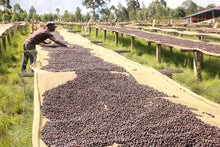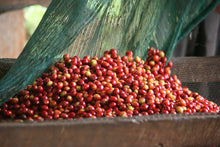medium roast. maraschino cherry, panela, cacao nib
region: tangara
subregion/town: ngozi
washing station: gisha
varietal: red bourbon
process: yeast inoculated (intenso) dry natural
elevation: 1750-1950 masl
importer: sucafina
from sucafina:
The area of Gisha, from which the station takes its name, was named by King Bigayimpunzi and is considered the headquarters of the Tangara commune’s jurisdiction. King Bigayimpunzi, who founded the Democratic and Rural Party in 1961, once lived in a beautiful palace on a nearby hill. Since then, the palace has been used as the home of highly ranked dignitaries who oversaw regional administration. The house has also hosted the commissaries who ruled over the Kiremba, Tangara and Gashikanwa communes. Located in Tangara commune, Gisha station sits near the Nyamuswaga River, infamous for its depth and breadth.
Most coffee trees in Burundi are Red Bourbon for reasons of quality. Because of the increasingly small size of coffee plantings, aging rootstock is a very big issue in Burundi. Many farmers have trees that are over 50 years old, but with small plots to farm, it is difficult to justify taking trees entirely out of production for the 3-4 years it will take new plantings to begin to yield. In order to encourage farmers to renovate their plantings, Greenco purchases seeds from the Institut des Sciences Agronomiques du Burundi (ISABU), establishes nurseries and sells the seedlings to farmers at or below cost.
Despite the ubiquity of coffee growing in Burundi, each smallholder produces a relatively small harvest. The average smallholder has approximately 250 trees, normally in their backyards. Each tree yields an average of 1.5 kilos of cherry so the average producer sells about 200-300 kilos of cherry annually.
During the harvest season, all coffee is selectively handpicked and dried for 2 to 3 weeks. After this, cherries are pulped, and coffee is placed in Epoxy-coated, concrete fermentation tanks. Intenso yeast purchased from the French company Lalcafe is added to the tanks. The coffee is left to ferment in this environment for approximately 96 hours.
LALCAFÉ INTENSO™ yeast (Saccharomyces cerevisiae) was specially developed for coffee production over a four-year period of research and trials. Trials in various regions and environments showed that Intenso is well suited to better control the fermentation process efficiency and to upgrade the cup quality. The yeast is able to control the fermentation process against the risk of spoilage micro-organisms that can generate undesirable defects. Furthermore, its specific metabolism and high capacity even at cold temperatures (minimum 15°C inside the coffee tank) allow for the expression of fresh and fruity characteristics of the coffee beans while respecting the unique flavors of each lot.
The longer fermentation time for yeast-processed coffees also allows for more developed flavors. The extra time enables the beans to absorb metabolites, which can enhance flavors. The lengthened fermentation time boosts complexity, acidity, brightness, floral notes and more.
Parchment is laid on raised beds to dry. While drying, parchment is repeatedly sorted and sifted to ensure even drying. Once dry, the parchment coffee is then bagged and taken to the warehouse. Before shipment, coffee is sent to Budeca, Burundi’s largest dry mill. The coffee is milled and hand sorted by a team of hand-pickers who look closely at every single bean to ensure zero defects. It takes a team of two hand-pickers a full day to look over a single bag. UV lighting is also used on the beans and any bean that glows (which is usually an indication of a defect) is removed. The mill produces an average of 300 containers of 320 bags per year.
Budeca is located in Burundi’s new capital city, Gitega. The city has a population of around 30,000 people. Since there are approximately 3,000 people working at the mill, mostly as hand pickers, this means that Budeca employs nearly 10% of the total population in Gitega for at least half the year (during the milling season). The same is true in the provinces of Ngozi and Kayanza, where Greenco and Bugestal are the first employers in the region during the coffee harvest season. This has an incalculable impact on a country like Burundi, which has unemployment rates above 50%, especially in rural areas and among young people.




